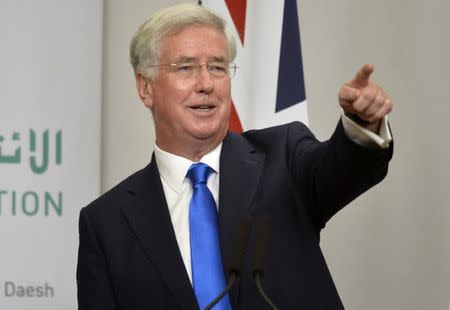'Forget it,' London tells Scots who want second independence vote
By Elisabeth O'Leary EDINBURGH (Reuters) - The UK government told Scotland on Thursday to abandon any hopes of holding another independence referendum before 2020, deepening a row with the devolved pro-independence government in Edinburgh over the impact of Brexit on possible secession. "No, forget it," Defence Secretary Michael Fallon told the Herald Newspaper when asked whether the government in London would facilitate a new referendum on independence, the stated long-term aim of Scottish First Minister Nicola Sturgeon. "The respect agenda is two-way," Fallon was quoted by the newspaper as saying, adding that Sturgeon should respect the 2014 referendum in which Scots voted 55-45 to stay in the United Kingdom and the UK-wide 2016 vote to exit the European Union. Sturgeon "has to respect the decision of Scotland to stay inside the UK in 2014 and the decision of the UK to leave the EU," Fallon told the Glasgow-based newspaper which opposed secession in 2014. Prime Minister Theresa May has repeatedly said she does not believe there is any need for a second independence referendum in Scotland but Sturgeon has warned that the Brexit plans of the government in London could force Scots to call another vote on the grounds that circumstances had changed since 2014. The June 23 ballot on Brexit called the future of the United Kingdom into question because England and Wales voted to leave but Scotland and Northern Ireland voted to stay. Sturgeon has repeatedly demanded that the interests of Scotland are taken into account during the Brexit negotiations with the other 27 members of the European Union and has asked for a special deal for Scotland including full access to the EU's single market. Fallon's remarks, which he later sought to temper, risk fuelling nationalist resentment in Scotland that England is both driving Scotland out of the EU and denying it any chance of an alternative via independence. Sturgeon said any attempt by the London government to block a second referendum would be a "disastrous move". While technically the British parliament, which is sovereign, could block another referendum on independence, to do so would provoke a constitutional crisis if polls indicated a majority of Scots were in favour of a ballot. A Scottish government spokesman said any bid to block a second referendum would be "a democratic outrage" that would only "succeed in boosting support for both a referendum and for independence itself." While Sturgeon says she wants Scottish independence, she will also seek to avoid triggering another referendum that she would lose; public opinion polls show support for Scottish independence is still at around 45 percent as it was in 2014. (Editing by Guy Faulconbridge and John Stonestreet)

 Yahoo News
Yahoo News 

